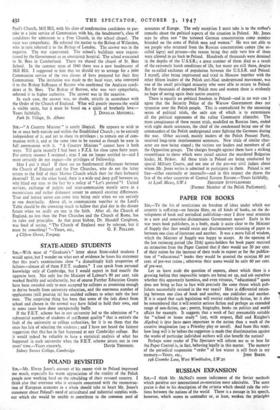POLAND REVISITED
SIR,—Mr. Elwyn Jones's account of his recent visit to Poland impressed me much, especially his warm appreciation of the vitality of the Polish people now working hard on the rebuilding of their ravaged country. I think also that everyone who is seriously concerned with the reconstruc- tion of European economy as a whole should take to heart Mr. Jones's statement about Poland's need of agricultural and industrial supplies with- out which she would be unable to contribute to the common pool of resources of Europe. The only exception I must take is to the author's remarks about the political aspects of the situation in Poland. Mr. Jones says he often saw "the tattooed German concentration camp .number branded on the arms of Polish men and women." He was not able to see people who returned from the Russian concentration camps (the so- called lagry) and prisons—the reason being that only very few of them were allowed to go back to Poland. Hundreds of thousands were detained in the depths of the U.S.S.R.; a great number of them died as a result of the extremely harsh conditions of life, but many are still there, despite the so-called exchange of population between the U.S.S.R. and Poland. I myself, after being imprisoned and tried in Moscow together with the other fifteen leaders of the Polish anti-Nazi underground movement, was one of the small privileged minority who were able to return to Poland. But for thousands of deported Polish men and women there is evidently no hope of seeing again their native country.
There is equally no political freedom in Poland—and in. no wilt, can I agree that the Security Police of the Warsaw Government does not tyrannise over the Polish people. This is contradicted by the unceasing series of political trials, the only aim of which is to exterminate all the political opponents of the ruling Communist oligarchy. The most conspicuous of these recent trials, modelled on Russian lines, ended with eight death sentences, the chief of the condemned being one of the commanders of the Polish underground army fighting the Germans during the war. Other accused, mainly leaders of the Polish Peasant Party, received long-term imprisonment sentences. New trials of similar char- acter are now being staged ; the victims are leaders and members of all the Opposition groups. The charges brought against them have a striking resemblance to those which were raised against the murdered Bulgarian leader, M. Petkov. All these trials in Poland are being conducted by special Military Courts, and not one of the pre-war civil judges about whom Mr. Jones writes is admitted to participate in them. Poland is not free—either externally or internally—and in this respect she shares the fate of the other countries of Central Eastern Europe.—Yours faithfully,
(Former Member of the Polish Parliament).


































 Previous page
Previous page